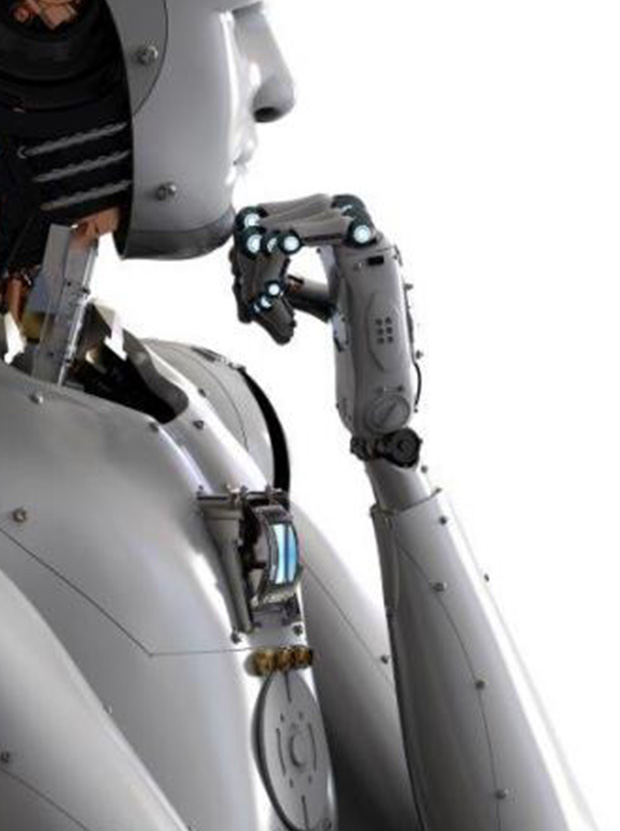

Blog: the Robots are coming, look busy!
Hello and welcome to the first in a series of (irregular) posts by me, in which I’ll be discussing data, artificial intelligence, ethics, and the future; this is because I’m a man with a lot to say, a well of enlightened thinking, and it is my duty to share this insight with you all. Definitely not because I was asked last minute to create a blog post. Not at all.
So here we are. For this introductory instalment, I thought I’d take you on a journey into the future, to a distant and alien world, a world run by robots, the year… 2027!
The inevitability of progress
The pace of change and development in the fields of machine learning and automation simply cannot be overstated, with advances and breakthroughs being made every week, some of which, whilst they may not seem so significant to the casual observer, are smashing through obstacles that many thought were insurmountable.
Whilst other advances, such as SpaceX managing to complete a successful landing, may have more Hollywood sex appeal, the creation of evermore nuanced and sophisticated algorithms capable of mimicking – and surpassing – the finest intuition and strategic that thinking humanity has to offer is where we will find the catalyst that ignites a social-industrial transformation on the scale of the agricultural and industrial revolutions.
However, unlike the two aforementioned epoch defining revolutions, the pace of change is much faster and the drivers more diverse, and there is one key enabler at the centre, facilitating this massive increase in speed and diversity.
Data
The digital age has created an enormous amount of data, and as we started to understand that data, to unlock its value, we began to hunger for more. The cycle continues to this day, with more and more channels through which data is captured. Smart meters, smart fridges, telematics, smart highways, smart cities – all of these record and consume data, combining with existing sources such as shopping habits and browser history, building a more and more complete picture of both society and the individual.
As the data captured about our lives becomes richer and richer, the capacity for machines to understand each area becomes greater. Right now, we are still in the dark, early stages of this technology being deployed on a truly life changing scale, but that will not be the case for long.
Processes and Decisions
Almost all the jobs we do – certainly the ones most would consider core to the functioning of our societies and economies – are made up of two fundamental parts, processes and decisions, with data (or information, or knowledge – whatever you want to call it) acting as a kind of Higgs field – permeating everything and ultimately controlling the nature of interactions.
We are successful in our jobs when we are able to optimise those processes (which often consist of lots of microprocesses) and use the data available to make the right decisions.
So far, all the available evidence points to machines of advanced sophistication being able to dwarf the human capacity for accurate repetition, data storage and recall, non-biased decision making, and pattern detection – everything that is needed to be successful at a given task – so it becomes a question of “when” not “if”.
How do we shape society for when machines are managing it for us?
I’ve been mulling over a couple of options:
The first, we merge with the machines, and move to a stage in our history where the internet is recognised as the first iteration of what would ultimately become the first global consciousness. Our sentience, belief in the sanctity of human life, and (largely) egalitarian ideals mean that natural selection is likely to play a far weaker role in the future of the species; instead we take a leap forward through embracing symbiosis with artificial intelligence (and likely physical upgrades too) and become Humanity 2.0 – Homo Machinus – most likely ultimately shrugging off deeply held convictions of free will and the individual in the process.
The second, we kick back, using the wealth and prosperity afforded us by an economy run by logical, precise machines to enjoy ourselves and pursue whatever interest takes our fancy. Sure, there will be a “high priest” caste of ultra-wealthy, all powerful python coders overseeing things for a while, but soon even that will be automated; humanity will live an existence completely emancipated from the burden of ensuring its own existence, quietly praying that its Brautigan machines of loving grace never get around to reading any Harlan Ellison.
Phew – and you thought you’d be getting a couple of paragraphs about which BI tool we’ve been messing with recently!
Why Even Worry About This?
Being in one of the industries driving the change and demanding the data that will facilitate such huge changes, it’s important to take a step back sometimes, get some perspective, and have a look at where we are heading!
Our road into the near future throws up some extremely interesting moral issues. Questions of free will, the right to privacy, our individualistic world view, society, and the nature of government and governed, need to be asked and examined; all of which, and others, we will explore later in this series of posts.
What do you think? Do you agree? Or do you think I’m totally wrong – is this all just ripples on the surface of our history?
Let us know what you think below!
If you’re interested in exploring any of these ideas in more detail, below you can find a reading list that influenced some of the article:
Homo Deus – Yuval Noah Harari
In The Age of The Smart Machine – Shoshana Zuboff
Intelligence Unbound – Blackford and Broderick
All Watched Over by Machines of Loving Grace – Richard Brautigan
I Have No Mouth and I Must Scream – Harlan Ellison
The Moon is A Harsh Mistress – Robert Heinlein

